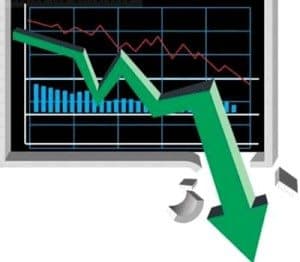
In the equity markets, investors who anticipate a collapse in the price of a share could opt for short selling. This involves borrowing the shares from a broker and then buying them at a later date, after the price has gone down, to return them to the broker. This mechanism does not work in the municipal bond market where it is generally not possible to borrow bonds as they are in the hands of mutual funds and individuals and not available for trading.
It is therefore necessary to look for a security that is traded on the stock exchange and is closely related to the fate of municipal bonds.
One could try short selling the securities of corporations involved in insuring the bond market, but only a small proportion of municipal bonds are covered by insurance. The insurers have already seen large falls in the price of their stock (NYSE: AGO is down 30% on the year) and the problems and uncertainties on the municipal bond market are already taken into account in the stock price.
Consider exchange traded funds
There is another way. Investors could try short selling exchange traded funds (ETFs) that track the municipal bond market. ETFs are traded on the stock exchange and can be bought and sold in the same way as other shares. It is therefore possible to short sell an ETF. The ETF tracks the performance of a particular market or index by acquiring a representative sample of securities from that market. Provided that the ETF tracks the municipal bond market widely throughout the US a collapse in the municipal bond market would be reflected in the value of the ETF.
The largest municipal bond ETF is the iShares S&P National AMT-Free Municipal Bond Fund (MUB).
An alternative strategy would be to look at the States where there is the greatest risk of defaults in municipal bonds and to short sell ETFs that track bonds in these States. Currently only the largest states have ETF’s dedicated specifically to their Muni Bonds, however this may change in the future.
Two states where you can employ this strategy now are New York with the iShares S&P New York Municipal ETF (NYF) and California with the SPDR Barclays Capital California Municipal ETF (CXA).
Embarking on a strategy of short selling municipal bond ETFs is a risky investment strategy and should be given very careful consideration. Many commentators and other players such as the credit rating agencies do not agree with the gloomy predictions of Meredith Whitney. Even if those predictions turn out to be true, the Federal government could move to provide additional funding to the States, helping their finances and thwarting the short selling strategy.
Trusted & Regulated Stock & CFD Brokers
What we like
- 0% Fees on Stocks
- 5000+ Stocks, ETFs and other Markets
- Accepts Paypal Deposits
Min Deposit
$200
Charge per Trade
Zero Commission on real stocks
64 traders signed up today
Visit Now67% of retail investor accounts lose money when trading CFDs with this provider. You should consider whether you can afford to take the high risk of losing your money.
Available Assets
- Total Number of Stocks & Shares5000+
- US Stocks
- German Stocks
- UK Stocks
- European
- ETF Stocks
- IPO
- Funds
- Bonds
- Options
- Futures
- CFDs
- Crypto
Charge per Trade
- FTSE 100 Zero Commission
- NASDAQ Zero Commission
- DAX Zero Commission
- Facebook Zero Commission
- Alphabet Zero Commission
- Tesla Zero Commission
- Apple Zero Commission
- Microsoft Zero Commission
Deposit Method
- Wire Transfer
- Credit Cards
- Bank Account
- Paypall
- Skrill
- Neteller
What we like
- Sign up today and get $5 free
- Fractals Available
- Paypal Available
Min Deposit
$0
Charge per Trade
$1 to $9 PCM
Visit Now
Investing in financial markets carries risk, you have the potential to lose your total investment.
Available Assets
- Total Number of Shares999
- US Stocks
- German Stocks
- UK Stocks
- European Stocks
- EFTs
- IPOs
- Funds
- Bonds
- Options
- Futures
- CFDs
- Crypto
Charge per Trade
- FTSE 100 $1 - $9 per month
- NASDAQ $1 - $9 per month
- DAX $1 - $9 per month
- Facebook $1 - $9 per month
- Alphabet $1 - $9 per month
- Telsa $1 - $9 per month
- Apple $1 - $9 per month
- Microsoft $1 - $9 per month
Deposit Method
- Wire Transfer
- Credit Cards
- Bank Account



